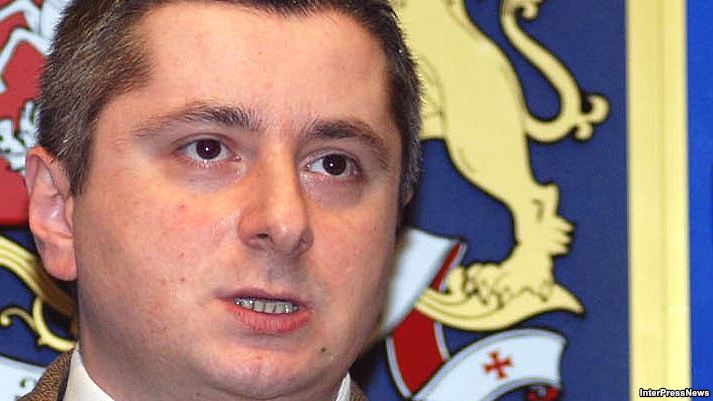
Georgian Government Accused of Attempts to Shut Down Opposition TV Channel
Publication: Eurasia Daily Monitor Volume: 12 Issue: 193
By:

Georgian prosecutors have questioned the head of the Rustavi 2 TV channel, Nika Gvaramia, in connection to his accusations of government pressure on his company (Civil Georgia, October 22). Gvaramia had claimed that a certain businessman, Aleksi Akhvlediani, told him on behalf of the government that he should leave Rustavi 2 and accept the inevitable change in the ownership of the company. Gvaramia says that Akhvlediani threatened to publish a video with secret details of the Rustavi 2 CEO’s private life. Defiantly, Gvaramia declared he would not stop his fight for freedom of speech and would defend the independent policies of Rustavi 2 in court (Interpressnews.ge, October 23).
Rustavi 2 is widely considered Georgia’s most popular TV channel. Its owners, brothers Levan and Giorgi Karamanishvili, are close friends of the country’s previous president, Mikheil Saakashvili (Humanrights.ge, September 22, 2012). Rustavi 2 serves as the primary media outlet for pro-Western forces in Georgia, including the opposition party, United National Movement (UNM). Several months ago, one of the TV company’s former owners, Kibar Khalvashi, lodged an appeal in Tbilisi city court, demanding the return of the company to him. Khalvashi claims that, in 2006, he was forced to sell Rustavi 2 to its current owners at a price much lower than the company’s market value (Civil Georgia, October 22).
However, Nika Gvaramia, the journalists employed at Rustavi 2, the vast majority of Georgian non-profit organizations concerned with this issue, as well as the political opposition are convinced that Khalvashi’s court case is not really driven by legal concerns over ownership rights, but is indicative of political intrigue on the part of the authorities. The government’s goal is allegedly to change the editorial policies of Rustavi 2.
Khalvashi is an influential associate of billionaire Bidzina Ivanishvili, the founder of the ruling Georgian Dream coalition. Journalists and civil society activists are convinced that if Rustavi 2’s ownership is replaced, the TV channel would stop being an opposition media outlet critical of the authorities. “There is little time left before the parliamentary elections in 2016. The authorities fear losing the elections and are trying to exclude the opposition TV channel from the media space by changing its leadership,” analyst Giorgi Nodia told the author (Author’s interview, October 20).
The court process regarding Rustavi 2’s ownership rights has gone on for the past several weeks. After Khalvashi’s complaint, judge Tamaz Urtmelidze ordered the confiscation of all property and the freezing of the majority of the TV channels’ bank accounts, which has significantly hampered the company’s activities (1tv.ge, October 8). Yet, Rustavi 2’s head, Gvaramia, promised to continue broadcasting despite these difficulties; he addressed the channel’s audience with an appeal to raise funds for continued operational costs (Dlmn.info, October 5). Many responded to the fund-raising request, while thousands of residents of Tbilisi came to Rustavi 2 TV’s offices to defend the company from possible forceful take-over attempts by the government (Svoboda.org, October 22). Politicians from the opposition UNM party joined the protesters. “We will not allow Russian oligarch [sic] Bidzina Ivanishvili to capture an independent TV channel, and we will lawfully resist,” parliamentarian Nugzar Tsiklauri declared (Author’s interview, October 24).
Meanwhile, the authorities refute claims they are steering the court’s proceedings. “The opposition is trying to politicize an ordinary litigation for ownership. Kibar Khalvashi is only trying to regain his property that was taken from him at the time of Mikheil Saakashvili’s rule. We have freed the court of any pressure, and the judge can take independent decisions,” one of the leaders of the ruling Georgian Dream coalition, the chairman of the parliamentary committee for defense and security, Irakly Sesiashvili, said in an interview with the author, on October 24.
However, the opposition and many in civil society distrust such statements. “The authorities try to kill freedom of speech in our country,” the head of the Association for European Georgia, Keti Gabiani, asserted (Author’s interview, October 24).
Incidentally, amidst the legal standoff around Rustavi 2, a scandalous video from 2010 appeared online. The clip contained disturbing footage of the torture of a suspect in police custody in Samegrelo region, and after it was posted to the Internet, UNM party offices in several Georgian cities were attacked by angry crowds (Svoboda.org, October 20). The opposition accused the government of staging these attacks to overshadow the scandal surrounding Rustavi 2 as well as recent polling results. UNM parliamentary deputy Sergo Ratiani points out that according to the latest public opinion survey by the National Democratic Institute (NDI) (Georgianjournal.ge, October 17), UNM is already ahead of Georgian Dream in the rankings (Author’s interview, October 24).
The case of Rustavi 2 also caused a public row between the president and the head of the government. Georgian Prime Minister Irakli Garibashvili referred to Nika Gvaramia’s allegations of pressure and blackmail as “very similar to provocation.” In addition, the prime Minister called UNM members “sadists” and suggested they should “thank people [i.e. the crowds that ransacked several UNM offices] for not doing to them what is shown on that video [of torture by police in 2010]” (Civil Georgia, October 22).
In response, President Giorgi Margvelashvili called a special press conference and stated that the prime minister’s statements “increased tensions instead of alleviating them.” According to Margvelashvili, the situation around Rustavi 2 and the attacks on the offices of the opposition party “escalated the political climate and created prerequisites for civil confrontation and violations of the constitutional order.” The president then invited all political parties and civil activists to a dialogue and cautioned Judge Urtmelidze against making any “hasty decisions regarding Rustavi 2” (Civil Georgia, October 22).
The former head of the Georgian State Chancellery, Petre Mamradze, a well-known long-time critic and political adversary of Saakashvili, argued that closing down Rustavi 2 TV “would be a blow to media pluralism in the country.” And while this TV company is a mouthpiece for Saakashvili and his party, he said, “it is independent from the authorities, often criticizes the actions of the current government, and is useful to democracy” (Author’s interview, October 24).
Mikheil Getsadze, an expert for the independent news agency GHN, expressed his bewilderment at the government’s attempts to change the policies of Rustavi 2 or even close down the station, when the ruling coalition “has all the prerequisites and resources to create an alternative party TV, which would defend the government as actively as Rustavi 2 does toward UNM and the ex-president.” Yet, as he argued, Georgian Dream may find it difficult to create a “talented, creative and popular TV channel” from scratch (Author’s interview, October 24). Silencing Rustavi 2 TV by legal means may, therefore, be a stop-gap measure by the Georgian government.




